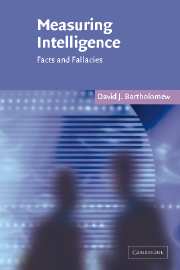Book contents
- Frontmatter
- Contents
- List of figures
- Preface
- Acknowledgement
- 1 The great intelligence debate: science or ideology?
- 2 Origins
- 3 The end of IQ?
- 4 First steps to g
- 5 Secons steps to g
- 6 Extracting g
- 7 Factor analysis or principal components analysis?
- 8 One intelligence or many?
- 9 The Bell Curve: facts, fallacies and speculations
- 10 What is g?
- 11 Are some groups more intelligent than others?
- 12 Is intelligence inherited?
- 13 Facts and fallacies
- Notes
- References
- Index
9 - The Bell Curve: facts, fallacies and speculations
Published online by Cambridge University Press: 22 September 2009
- Frontmatter
- Contents
- List of figures
- Preface
- Acknowledgement
- 1 The great intelligence debate: science or ideology?
- 2 Origins
- 3 The end of IQ?
- 4 First steps to g
- 5 Secons steps to g
- 6 Extracting g
- 7 Factor analysis or principal components analysis?
- 8 One intelligence or many?
- 9 The Bell Curve: facts, fallacies and speculations
- 10 What is g?
- 11 Are some groups more intelligent than others?
- 12 Is intelligence inherited?
- 13 Facts and fallacies
- Notes
- References
- Index
Summary
Status of the Curve
We have been rather dismissive of the Bell Curve. It would be fair to summarise our position so far as being that the Bell Curve plays no fundamental part in the measurement of intelligence. The reasons for the central role accorded it by Herrnstein and Murray were never adequately spelt out but they do seem to have recognised that it was an artefact. We have argued that, as a description of the distribution of g, it is pure fiction; a useful fiction perhaps, but a fiction nonetheless. Perhaps the situation is not unlike that said to obtain between mathematicians and physicists. Mathematicians worked on the Bell Curve because they believed the physicists had shown it to be an empirical fact, whereas physicists used it because they thought the mathematicians had proved a theorem which required its use!
Unlike g, IQ is an empirical index so it certainly has an observable distribution in any population. Furthermore there are good reasons, which we shall enumerate below, for expecting the distribution to be rather like the Bell Curve. Nevertheless, Wechsler, for example, understood that anything purporting to measure intelligence must necessarily have an arbitrary distribution and hence that he was at liberty to choose anything that was convenient. He, therefore, decided to calibrate his measures in such a way as to make their distribution conform precisely to the Bell Curve. The use of this curve was, therefore, no more than a convention, not an empirical fact at all.
Information
- Type
- Chapter
- Information
- Measuring IntelligenceFacts and Fallacies, pp. 85 - 95Publisher: Cambridge University PressPrint publication year: 2004
